Connections
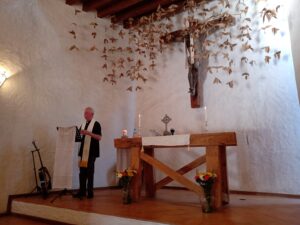

 Please be in prayer for this small, but dedicated group of Anglicans who are exploring the possibility of forming a congregation for the glory of the Lord and the extension of His kingdom in Mexico.
Please be in prayer for this small, but dedicated group of Anglicans who are exploring the possibility of forming a congregation for the glory of the Lord and the extension of His kingdom in Mexico.
by Daniel and Rebekah Behrens, SAMS Missionaries in the U.S.
“It was the best of times, it was the worst of times…it was the season of Light, it was the season of Darkness, it was the spring of hope, it was the winter of despair.”
These famous words begin Charles Dickens’ A Tale of Two Cities and they come to mind when I reflect on the stark contrasts we have seen during the season of Epiphany. We want to share honestly about both the darkness and the light, with the assurance that Jesus gives: “The light shines in the darkness, and the darkness has not overcome it” (John 1:5).
On his first day in office, President Trump halted the United States Refugee Admissions Program. Flights were cancelled even for families who were fully vetted and had been waiting for years for a fresh start. This was painful to see, but not a surprise.
Days later the State Department issued an unexpected “Stop Work” order to organizations that resettle refugees. This meant that refugee families who had arrived in November, December, and January were left without the support which the U.S. government had promised them. The first 90 days are a critical time where agencies help families struggle for stability (learning how to ride the bus, finding groceries, signing up for school, finding a job, etc). In the best of circumstances, this is a huge effort for the agency and a massive adjustment for the family. Suddenly, agencies across the country had the rug pulled out from them. In Pittsburgh, they reeled to adjust, laying off staff, re-assigning families to other programs, and putting out pleas for volunteer help and financial support.
Let me say here that I am in favor of reforms to the way immigration to the U.S. happens. There is much we can and should debate and reform. But refugee resettlement is a model of regulated, legal immigration for families who do not have the option of returning to their home countries. To halt resettlement and cut support without warning to vulnerable families we have already invited into our communities is a level of barbarity which still makes me shake with anger and bow my head in shame.
Where have we seen the light in the midst of this darkness? Because of our existing relationship with Hello Neighbor, one of the resettlement agencies in Pittsburgh, Church of the Ascension was positioned to respond quickly. Within days of the “Stop Work” order our senior pastor shared a request with the congregation for gift cards to help purchase groceries for families who were still in temporary housing. We, in partnership with another missionary couple within Ascension, extended an invitation for congregants to form a “Rapid Response Team” (RRT) to meet needs in our area. The congregation responded with overwhelming generosity. Over 50 people came to an informational meeting to learn more about the RRT and we received thousands of dollars in gift cards.
Within days, the RRT was on the move – picking up groceries, driving people to the grocery store, or showing them how to use the bus. In the weeks since then, our efforts have included setting up a home, gathering and delivering furniture, driving to medical appointments, providing English learning resources, sharing clothing, playing at a park, going to the library, and simply visiting and drinking tea. We have focused on about a dozen recently-arrived families from the Congo, South Sudan, Eritrea, Honduras, and Afghanistan. The resettlement agencies have had to continue laying off staff and making hard adjustments as it becomes clear that federal support is likely to stop for a prolonged time. In the midst of this darkness, it has been an absolute honor to see God’s people rising to the occasion. Their joy and sacrifice bolster our faith that God is still at work.
Read more about Daniel and Rebekah Behren’s ministry to immigrants and how you can support them and the immigrants they serve here.
|
|

by Cate Waddell, SAMS Missionary to Honduras

This year at Joy Christian Academy, I am teaching English Language Arts to the 5th, 6th and 7th graders. I am with each grade about 2 hours a day.
We have just started reading Miss. Daisy is Crazy in 5th grade. We are about to start Charlie and the Chocolate Factory in 6th grade. We are a little more than halfway through the book Hatchet in 7th grade. Along with reading books we are working on writing, grammar, vocabulary, and spelling.
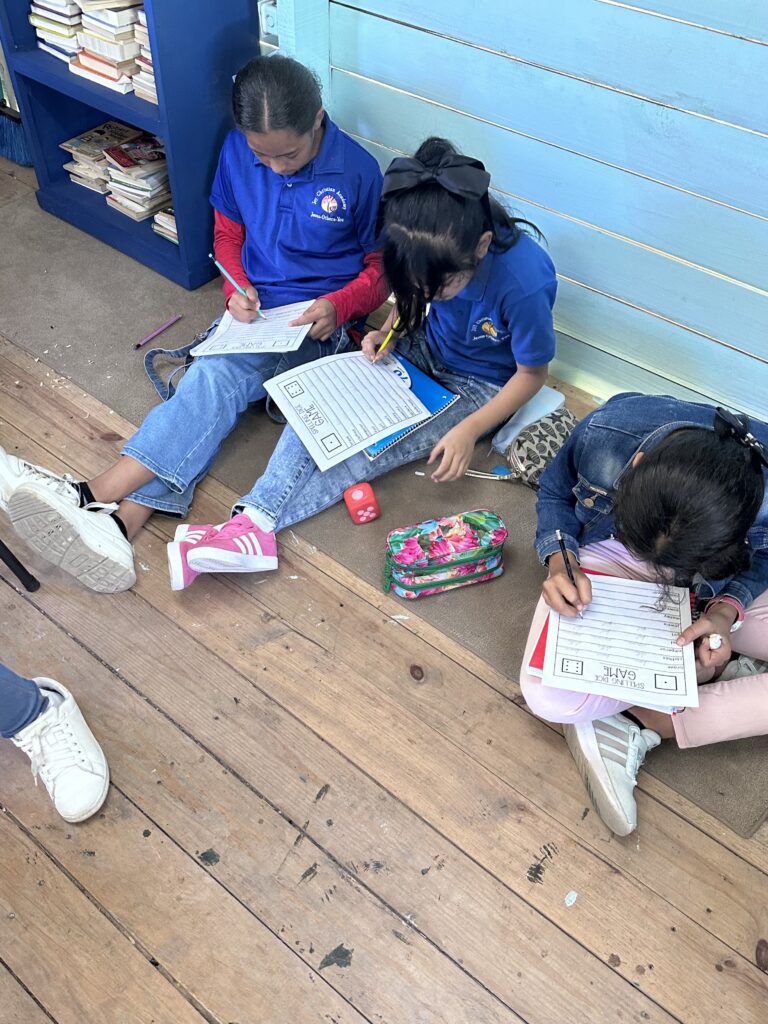
Our value this month at Joy for our devotionals is adaptability. The students are learning what adaptability is, how we can be adaptable, and looking at some people in the Bible who always trusted in God and were able to adapt well.


I am also helping at the church at the children’s home as the assistant music director. I am also learning and playing the piano in the band alongside the children.

To learn more about Cate’s ministry and how to support her work with at-risk youth at the The Lamb Institute and Joy Christian Academy go here.
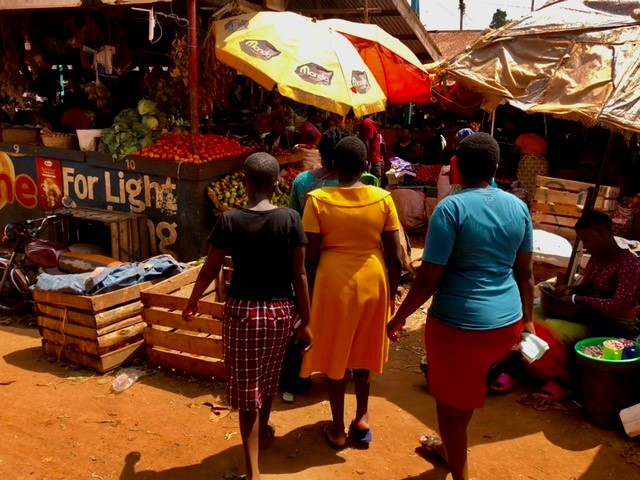
Even in “ordinary time” African colors are always bright. From the Chico Market in Mukono Town.
by Richard and Catherine Ranger, SAMS Missionaries to Uganda

So be careful how you act; these are difficult days. Don’t be fools; be wise: make the most of every opportunity you have for doing good. Don’t act thoughtlessly, but try to find out and do whatever the Lord wants you to. (Ephesians 5:15-17)
The Roman Catholics have two seasons in their liturgical calendar that they call “Ordinary Time”. The longer of the two they formerly called “Pentecost” (in the 20-odd weeks that follow the Sunday feast of the same name) and the shorter of the two formerly called “Epiphany”, which runs from that feast to Ash Wednesday. From a spiritual standpoint, I’m not sure what is gained or explained through the use of the term “Ordinary Time”. But from the standpoint of a mirror between faith and human experience, the term is apt.
There are seasons throughout our lives that are ordinary time, like the midweeks of school years once October arrives when the new school year and new homeroom are no longer new, and life is dominated by the recurrence of homework and the approach of tests. Any profession or any job involves periods of ordinary time that fall between major project assignments or the odd crisis. So it is with service in mission. The encouragement comes from the fact that if a period in mission experience meets the criteria for ordinary time, then mission life is normal life, and an indicator that one is where he or she belongs. These are some scenes and stories from our “ordinary time” serving here at UCU – including a number of vignettes of students whom we have been fortunate to get to know and whose journeys we are privileged to follow.
Catherine’s role in the administration of the UCU Honours College still does not have a title, but it involves plenty of work. Dickson Tumuramye took over as Director last year, and with Catherine’s assistance, has been hard at work re-establishing it as an experience of intellectual and personal challenge and growth for the students enrolled. The principal expectations for the students are involve the completion of four research papers over four semesters, the preparation of a number of presentations, and participation in weekly workshop discussions held Thursday evenings. There is also a weekly Wednesday early morning prayer fellowship, departmental meetings, and meetings with students, mentoring and otherwise. The Wednesday fellowships allow the option of in-person or Google Meets participation. If Catherine gets up in time to walk up to Thelma Hall to join in person, Trooper goes with her. In recent months Trooper has definitely become much more of a senior dog (he’s over thirteen now), so as quiet as he has become he’s no longer much of a distraction and once at Thelma Hall finds himself a place on the floor to rest next to Catherine.
Thursday evening workshop nights can run late but are almost always very engaging. In addition to student presentations on topics of their choice, there is usually a speaker on a topic relating to faith or professional development. A couple of weeks ago I collaborated with our friend, former Jessup Moot Court participant, and former Honours College student Lastone Gulume (now a managing partner with a Kampala law firm) on a joint talk about situations when job roles or assignments can present a challenge to one’s faith.
Most other Thursdays in the spirit of “ordinary time” when Catherine is at Honours College workshop night, I’m getting the laundry off the line that Dorothy our housekeeper has hung to dry that day – although as the photo below will show, Catherine spends much more time with the laundry than I do!
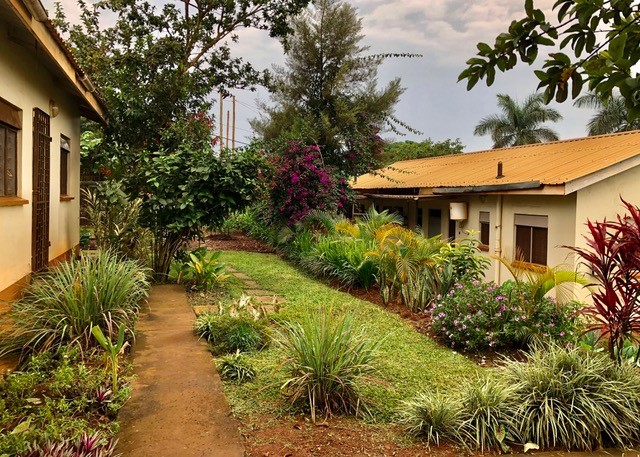
A Saturday morning in Tech Park where we live. For the first time since we’ve been here, all eight Tech Park units are occupied. We even have another missionary household: William and Jennifer Hatzfeld from California who have come here to UCU and to East Africa with the Meros Center. The Meros Center is a research and training community where relationships and resources come together to measure, innovate, and share impact in Christian health ministry.
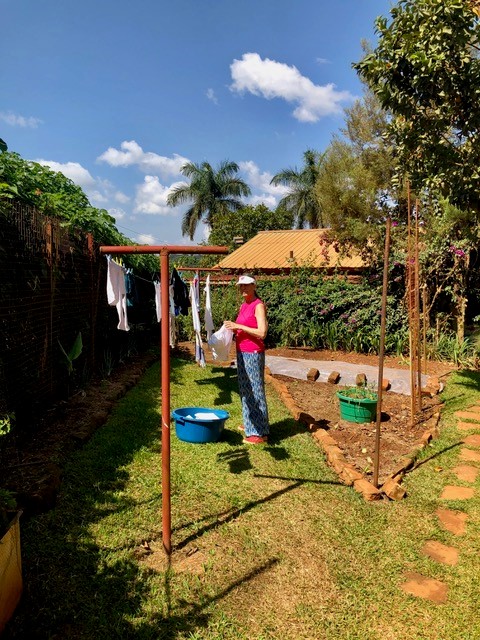
With all eight Tech Park units occupied, including three with families with pre-school and school-age children, the liveliness of their games and laughter is our neighborhood soundtrack. With the newest family having added four children – Tech Park now has a total of 10 children (eleven when Olivet is home from boarding school – although I expect she might object to being lumped in with the “children”). With all those households and all those children, clothesline space is at a premium in Tech Park!
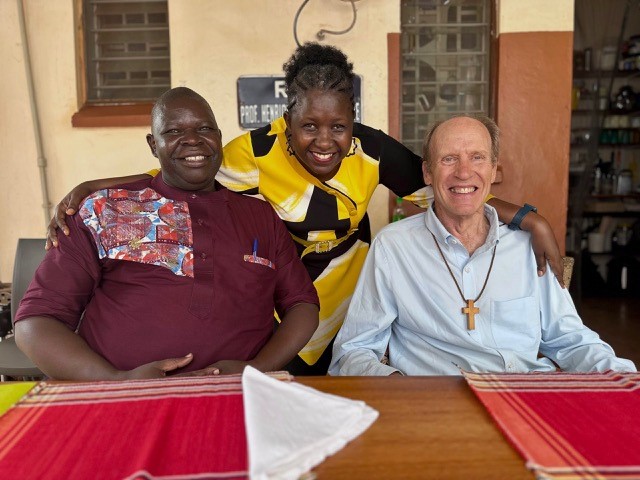
Because those celebrating birthdays and anniversaries during the prior week are called out every Sunday at worship here at UCU, we discovered that two other friends celebrate their birthdays on February 5 like me: Richard Ekadu (L) who manages the campus dining hall, and Prim Tumuramwe (C), who is married to Catherine’s boss Dickson, the Honours College Director. Naturally we had to have a gathering of the “February 5 Siblings”, and of course there was cake.
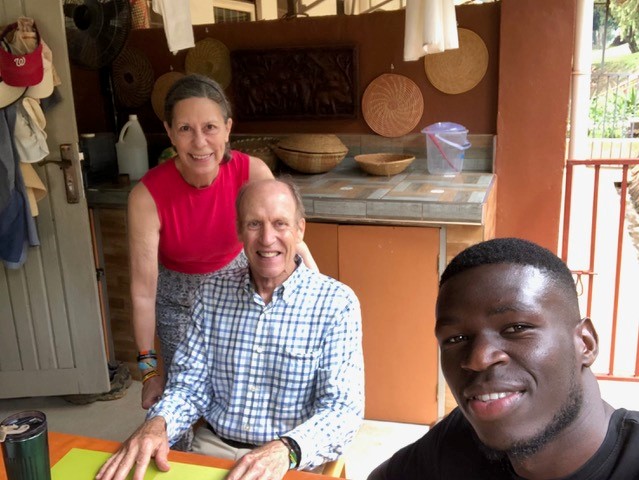
With our friend Nickson Tumusiime, who graduated in October with a bachelor’s degree in business administration with a major in accounting. One of the top students in the School of Business, Nickson is looking carefully at graduate study opportunities in the US. Nickson starred on UCU’s men’s volleyball team and also plays on one of Uganda’s national teams – in his fifth year of organized play
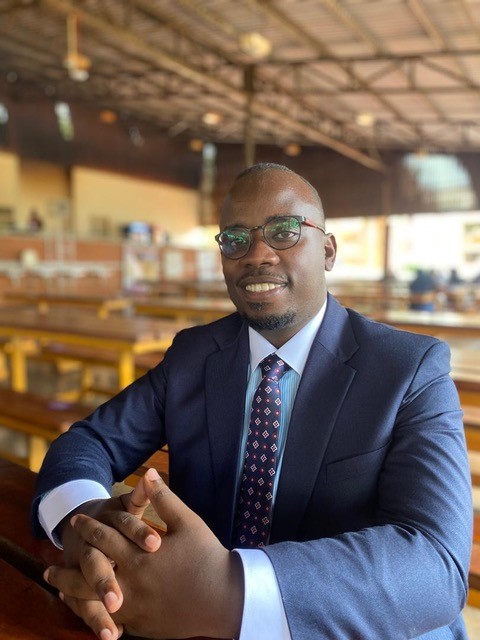
Our friend Fred Burondwa, whose story is described in the text of the newsletter, who has just received his letter of acceptance to the Master of Energy Transition Program at Dartmouth
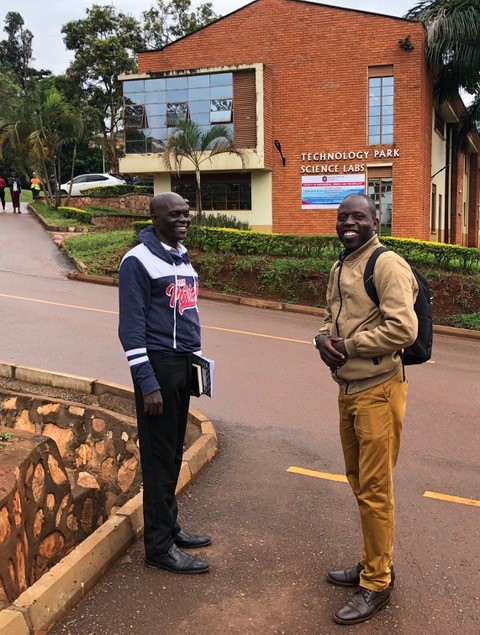
Our friends Runcie and Walter who are months away from graduating from the Bishop Tucker School of Divinity & Theology. Their home is in Nebbi Diocese in far northwest Uganda (west of the Nile and adjacent to Congo), and we will travel to their ordination at the end of June. They will serve as worker priests in rural villages in Nebbi Diocese.
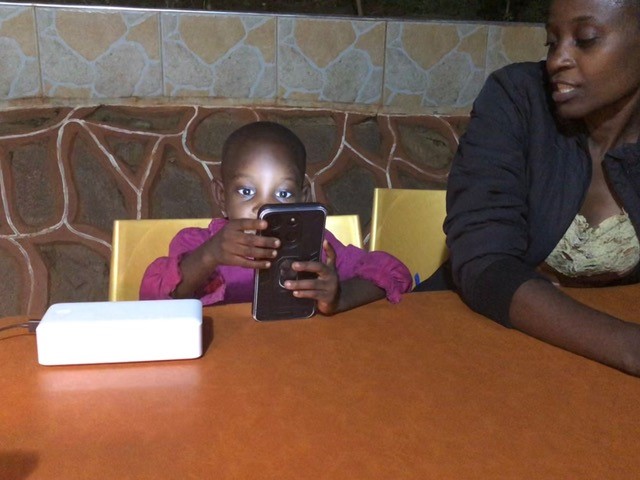
Our neighbor (and Catherine’s goddaughter Nyangoma) is fascinated by something on my iPhone as her mother (and our good friend) Immaculate looks on.
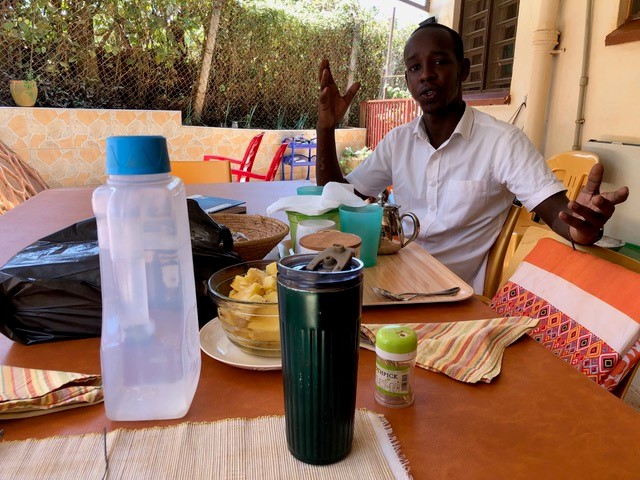
Nicholas Akampurira was one of the better students in my Corporate Governance class a year ago. He graduated in October and I ran into him when he was back on campus for some paperwork he needed. We agreed to meet for tea (and fresh pineapple). Nicholas recently advanced from intern to full-time account manager with UGAFODE Microfinance Limited, an MDI (micro-deposit taking institution) or microfinance lender providing affordable credit services to customers, the majority of whom are women with small farms or businesses. UGAFODE offers savings accounts for people with very small asset bases (some merely in the tens of dollars US), a mix of loan products, and money transfer services. Nicholas travels to his clients’ homes, shops, and farms in rural Uganda, listens to them, and helps to guide them to pursue goals and to develop achievable plans. Some of his clients are refugees from conflict in Sudan, or from the desperate poverty of Burundi. Nicholas is actually a banker at a very small scale, helping to identify and to support small businesspeople to take their next step. Nicholas says “it’s all about relationships.” Remembering him from my classroom I know that Nicholas possesses the heart, the ethics, and the energy that will make a difference for those he serves.
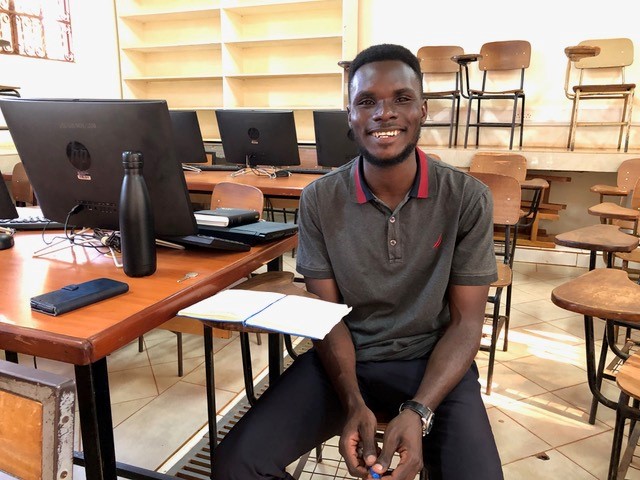
Okot Innocent, who graduated with a bachelor’s in Engineering in October and who now interns with the Department of Environmental Engineering, is the principal steward of the solar water heating project for the UCU campus dining hall. The project took shape in 2022 as a result of student research initiated through the Dartmouth Humanitarian Engineering Program, blossoming as a student-to-student learning effort involving UCU and Dartmouth students over more than two years. Okot is project lead on the design and installation of the project’s third phase, which will involve installation of a photovoltaic system to use solar power to produce electricity to charge a coil to heat stored water. This will allow side-by-side comparison with the present solar thermal equipment that uses the sun’s power to heat water as opposed to producing electricity. We hope to learn which approach is more cost effective, simpler to install, operate, and maintain, to better understand which offers a more useful model here in Uganda as a substitute for the current and widespread reliance on biomass/firewood for institutional-scale cooking.
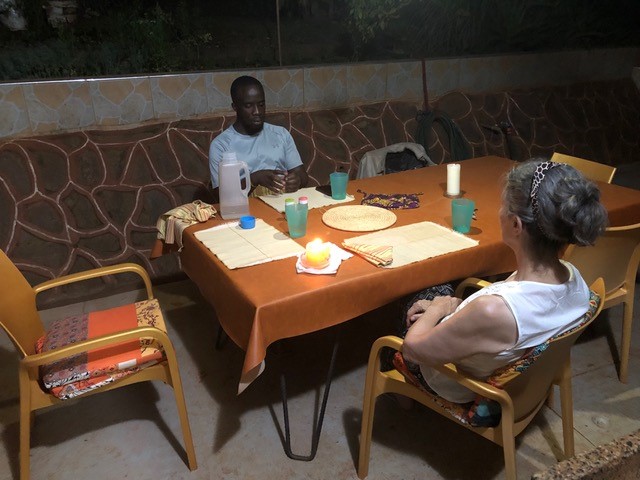
Our friend Daniel Tumusiime (no relation to Nickson) visited for dinner recently. Having graduated in 2022, Daniel is now the staff engineer for a coffee producer here in Uganda, where he handles matters ranging from water and waste systems, mechanical issues with processing equipment, road maintenance, you name it. At dinner with us, Daniel shared a multitude of insights on how a mid-sized Uganda company finds opportunities and an ever-changing coffee export market – seeking markets as far away as Poland and Russia. Some may remember meeting Daniel and the UCU team lead for season #1 of the UCU-Dartmouth solar water heating project.
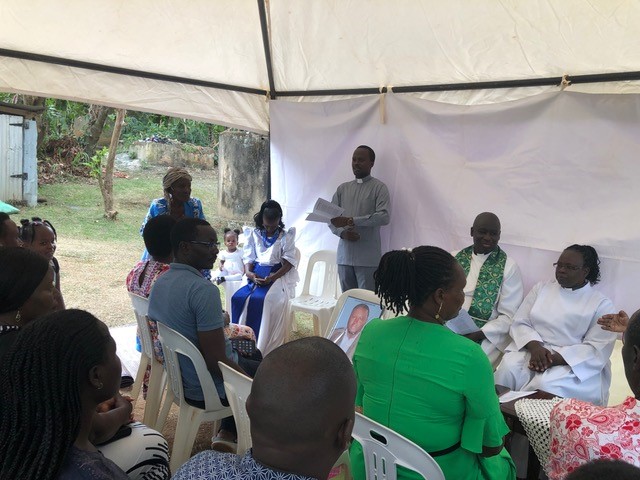
Joining our campus community in prayer, mourning, and remembrance, honoring the life of Frederick Muganza (see portrait on chair in the center of the photo), who was father to our friend and former Tech Park neighbor Joy Kamoga. Here in this photo Joy’s husband, Rev Alex Kamoga is offering a tribute to his late father-in-law. Joy is seated immediately to Rev Alex’s right. The gathering of family, friends, and community to share grief with the bereaved here in Uganda is something deeper than mere “custom”. It is the superpower of a culture that bears the spirit of the village in its soul.
Wednesday evenings Catherine and I host our fellowship group on the patio of our Tech Park home. We’ve written before how our former next door neighbor, Mary Chowenhill, showed us the value of increasing the useful space of a Tech Park unit by fifty percent by putting a roof over the patio. Unfold a second table to add to the eight seat table we have on the patio (and where we eat virtually all our meals), gather all available stackable plastic chairs among the households in Tech Park and we can host 16 or more for our fellowship, who include neighbors, students, and friends, and who can come from as many as six different countries – and speak any number of languages. We serve tea, biscuits, groundnuts, and chapattis and hard-boiled eggs for our guests -especially the students – to take home.
The patio is also where we meet students for conversations. Some are regulars. Esther, a fourth year law student considering a possible masters’ program after she graduates in July, is among Catherine’s mentees, and an Honours College scholar. Okot, who graduated with a bachelor’s in Engineering in October, comes by to avail my services as a sounding board as he advances the design of a photovoltaic unit for the solar water heating system for the campus dining hall kitchen from concept to prototype.
Over the past few months I’ve been meeting with Fred, a law student who graduated last July who visited to sound me out on the idea of pursuit of study in the field of energy policy. Our discussions led to Fred asking if I would prepare a letter of recommendation on his behalf. He also asked for my assistance on the two professional statements that were required for his application. Among students with whom I’ve worked here, Fred is an unusually good writer. In the years I’ve known him, he has impressed me with his analytical capabilities as well as his skills as a good storyteller to support his analysis, as I’ve watched him advance toward a mature and discerning perspective on how to apply his gifts, his education, and his aspirations in ways that can make a difference for his society.
Thus it was an occasion for great joy on my part when he texted me last Thursday evening to let me know that he has been admitted to the Master’s in Energy Transition program, a new program jointly administered by the Guarini School of Graduate Studies and the Irving Institute for Energy and Society at Dartmouth College, my alma mater. The College’s graduate studies website says, “Dartmouth’s nine-month, residential MET degree program provides interdisciplinary coursework, hands-on experience, and industry mentorship to equip early-career professionals with the skills and networks needed to help power a more sustainable, climate-stable future.” Fred’s vision is to focus his studies on practical, scalable renewable energy systems for farmers in East Africa. Fred grew up on a farm in a village in the western part of the country. In Hanover, Fred will learn, and he will also contribute and help others to learn. Dartmouth, Fred, and Fred’s fellow students in the program will all be blessed.
So that is a window into “ordinary time” as we experience it here at UCU. Your encouragement, friendship and support are indispensable to sustaining us as we serve here.
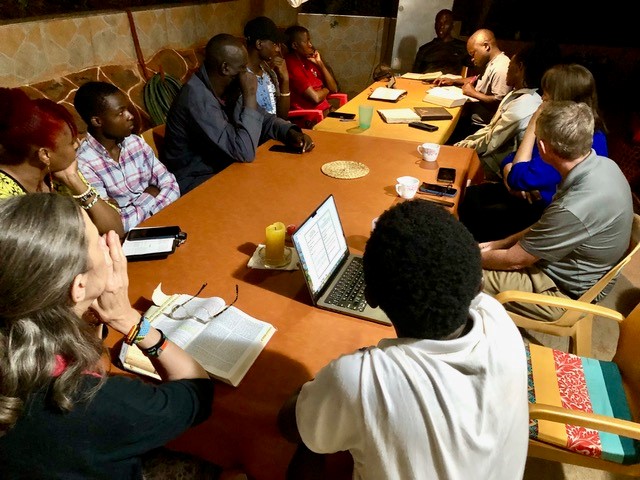
Our new neighbors have helped to double the size of our Wednesday evening fellowship of Americans, Ugandans, and friends from Congo, Tanzania, and Kenya. Thankfully we still have enough stackable plastic chairs from among our several households to find seats for those who come.
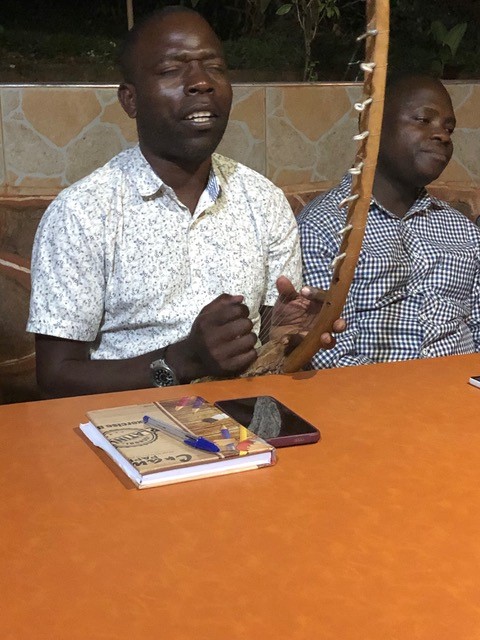
Our fellowship opens offers lively conversations about scripture, faith, and life with our neighbors – opening the doors of our experience to learning from them as peers, reminding us that we are servants here. And if our friend Walter Jerapha brings his adungu – a Ugandan harp of traditional design, the music can be wondrous.
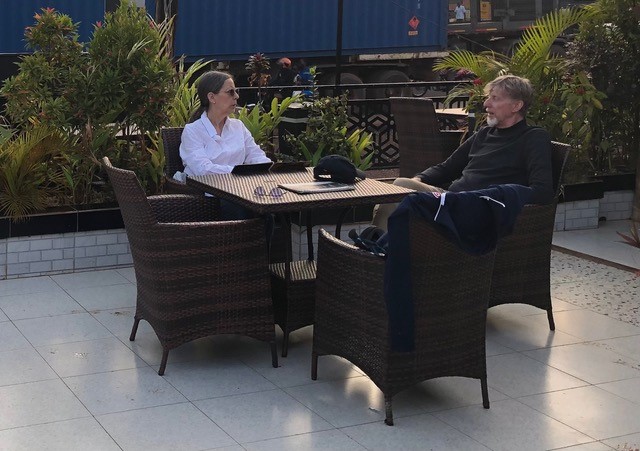
Catherine in conversation with our friend Thom Froese, a Canadian journalist who visits UCU every year to assist the School of Communication and to mentor students here. For Catherine and me as (still) relative newcomers, Thom and his wife Dr Jean Chamberlain Froese are elders – people whose example is an inspiration and whose friendship is a gift. Thom and Jean came to Uganda from Yemen where the disorder and violence of that country proved a barrier to serving there in the field of medicine and women’s health. Thom tells their story in his book ‘Ninety-Nine Windows: Reflections of a Reporter From Arabia to Africa and other Roads Less Travelled’ , which may be found through his website https://thomasfroese.com/.
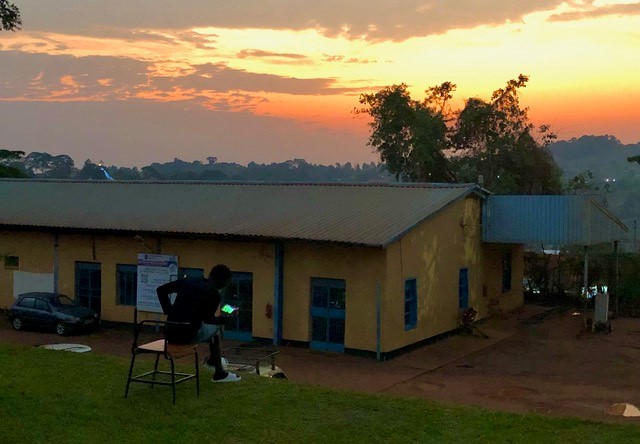
At dusk in Tech Park, a student checks his smart phone. Serving here at UCU reminds us every day that we live in an interconnected world. The very act of preparing this newsletter puts me on the internet to access MailChimp, the commercial email marketing platform SAMS makes available to its missionaries serving from Chile to the Solomon Islands. In the weeks since our last newsletter, with the gutting of the agency US Aid for International Development (USAID), the current administration of our country has set in motion effects that risk profound harm across that interconnected world. We won’t take up your time here presenting the policy arguments as to why this action is as destructive as it is at so many levels in the majority world (it is so, and information on the subject is abundant). Instead, we want to share the story that ordinary life here in Uganda has enabled us to meet people in whose footsteps we follow, like William and Jennifer and Thom and Jean, and to students to whom we have introduced you in this newsletter, like Okot and Fred and Nicholas, and in previous newsletters like Miriam and Racheal and Daniel, or our friend Rev Bisoke Balikenga in Bunia, DR Congo, whose Peace Center community daily welcomes refugees fleeing the war in Congo between the country’s fragile government and the forces of warlords armed and backed by neighboring Rwanda. Our friends serve on the front lines between peace and conflict, between health and disease, between ethics and corruption. In the metaphor of the struggle against evil in a darkening world explored by Madeleine L’Engle’s magisterial novel from 1962, ‘A Wrinkle in Time’, the friends we have encountered here are meeting the challenges of darkness with hope, with grit, and with servant’s hearts. And with love. As Ms L’Engle writes: “To love is to be vulnerable; and it is only in vulnerability and risk—not safety and security—that we overcome darkness.” In a time when an American Administration can destroy a program to combat AIDS in Africa that has saved millions (to name just one of the USAID programs), we, and most everyone we know, are each doing what in comparison may be considered small things. But if it is the will of the regime directing our government for us to cease to do big things, then we shall change the world by doing small things. Because, as author Madeleine L’Engle quotes from Paul’s first letter to the Corinthians: “God chose the foolish things of the world to shame the wise; God chose the weak things of the world to shame the strong.” And as the student in the photo with the smart phone shows, it’s an interconnected world. The same world. Our world. Along with our friends here, we do what we can to respond to assist that world – in ordinary time.
To learn more about Richard and Catherine Ranger and to learn about how you can support their work in Uganda go here.
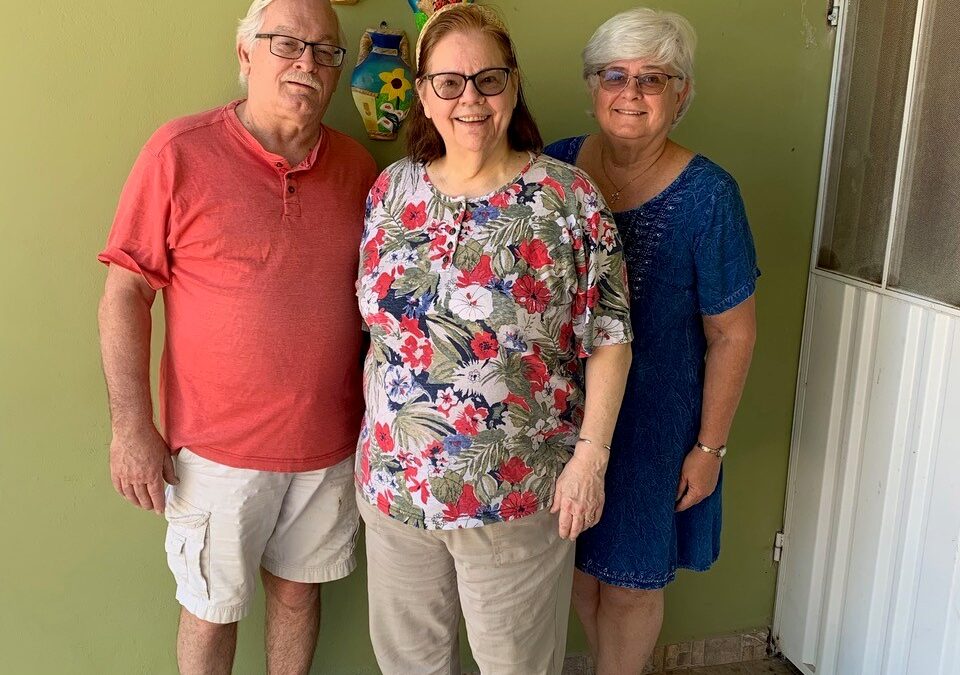
by Susan Park, SAMS Associate Missisonary
Our plane leaving Pittsburgh was delayed about half and hour while they de-iced it. When we arrived in San Pedro Sula it was 90º! Talk about extremes!
So much has changed since we lived there. We discovered that now to fill out the customs form, you have to do it with a QR code on your phone. (Cell phones are everywhere now.) We walked right past the posters so the fellow who was helping us, did it with his phone for us. When all eight suitcases and backpacks went through their x-ray machine, they pulled aside the big black one. “What is this?” “It’s a donated used sewing machine. It’s going to a workshop for poor women in the capital to learn a trade. And there’s another one in that suitcase.” And I handed him the letters from the workshops explaining that they were all donations. I was praying that he didn’t want to open the machine case itself as it was stuffed full of thread in all the spare spaces, which would have spilled all over the place. Praise God, they didn’t open any of the others and let us go without having to pay any duty on what we brought in.

Not having gone to bed the night before because the shuttle picked us up at 3 AM, we took naps until dinner time. Bp. Lloyd Allen met us and we got caught up on what has been happening in the diocese and the plans for the workshop that John and he would be teaching with the new deacons and those who are pursuing the permanent diaconate.

Up at 6 the next morning to head to Tegucigalpa the capital where I would see the workshops and drop off the machines and supplies. Bishop Lloyd sent me in a church van with a driver to help with the two suitcases, a sewing machine, and my backpack so that I didn’t have take a bus. About 6 hours later, after trying to follow GPS and getting vaguely lost, we arrived at the Jericho workshop and school where we dropped off the first machine and met Noah (son of former SAMS Missionary Betsy Hake) who introduced us to the women in charge of the workshop. We unpacked the very full, very heavy suitcase with the sewing machine and materials. Noah showed me around the school as well and introduced me to some children from an outreach project they have. Unfortunately, I was not able to meet with Betsy as she was away on a much-needed sabbatical. The Jericho Villa where Betsy lives and has the children’s home and another school is several hours further away out in the countryside, so I was not able to go there. The far photo has some of the items that are for sale made in their workshop.

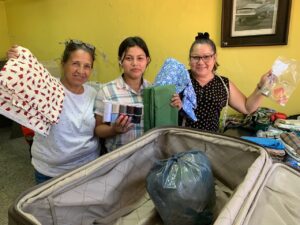


Then onto LAMB Institute where I would stay with SAMS missionaries, Steve & Debbie Buckner. LAMB was founded almost 25 years ago by former SAMS Missionary Suzy McCall as the Latin American Mission and Bible School to train Hondurans in discipleship and as missionaries. Now the program focuses on children who have been abandoned. The youngest is only 6 months old. When they turn 18, the government regulations state they must move out, so they have established a transition house where they live and help them finish schooling to be able to get a job. Their recent project is a home for those who will not be able to live on their own; 2 children who are blind, 2 with cerebral palsy, and 4 others with mental health and behavioral issues. They also have a school on the campus and another in the village down the road. They have a farm where they raise a lot of their own food, as well as chickens and sheep.
This is Alexi, who was my driver, with the sheep eating sugar cane

The other man with the chickens is Ariel who works the farm.

The children are encouraged to help as well.

Debby unpacking the supplies
Debby was delighted to get the sewing machine and supplies as she teaches all kinds of handcrafts with the girls. You can see the pile of fabric as well as the supplies in the suitcase. It was stuffed full as was the sewing machine case. Steve teaches wood working, helping them learn about tools and how to use them. They have a store that’s in an old school bus. When the crafts are sold, a tithe goes to the church and some money goes to cover the use of the tools or the supplies and some money goes into a savings account for the children which is theirs when they turn 18.

Crosses that the girls made with “diamond dots”

Steve, Debby and me.
As is often the case, there was a misunderstanding. Alexi, my driver, didn’t have family there to stay with. Praise God, Steve knew of a hotel they had used for groups that was close by their house. But it took only cash, so we went in search of an ATM 20 minutes away. The first one kept rejecting my cards, only to find that it was broken. The fellow outside the Municipal building told us where to find another one, which thankfully was just down the road. Success! Back to the hotel to pay for the room, only to find that the owner wasn’t there, only a security guard who didn’t have change for L/.500 bills. So I gave him most of the money, gave more to Alexi and told him to go buy breakfast in the morning so we could break the bill and pay the rest that we owed. Well, Alexi was the only one staying there and the guard wanted to go home, so he just gave Alexi the key to the gate so he could come back in after he left for dinner.

This was a receipt for the money I gave him; a corner torn out of a book.
Saturday morning, Steve took us around and showed us the children, the farm, and the buildings. It is amazing what God has done in such a short period of time. Then we took off back to San Pedro Sula, another 6 hour ride. I was glad to get back to the hotel and rest.
Thank you all for your prayers. The next letter will cover what John is doing.
To learn more about John and Susan Park and their ministry please visit this page.
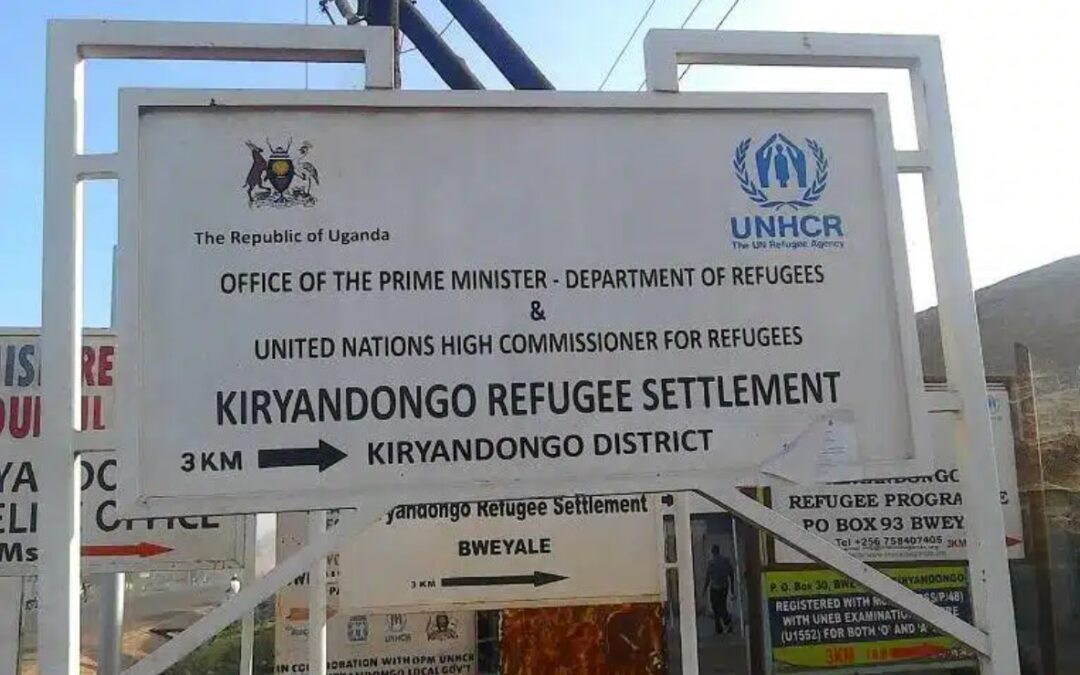
It’s a dusty, jaw-rattling, two-hour drive over rough Ugandan roads to get to the Kiryandongo Refugee Camp in northern Uganda. SAMS Missionary Cathy Clevenger and her team make the drive once or twice a month to minister to groups of refugees living there, but wisely, not during the weekly food distribution. The camp is a city in its own right. A sprawling sea of homes spread out for miles, which include schools, churches, make-shift shops, U.N. health clinics, and the requisite food distribution points. It’s comprised of nearly 100,000 people, who represent just a portion of the fallout in terms of the real human cost caused by the carnage of civil war and continuing tribal conflict in South Sudan and Sudan.
One of the stark realities, besides the sheer size of the humanitarian dilemma here, is the excruciating trauma. “The majority of the population in the camp is women and children” says Cathy. “Most of the Sudanese men have either been killed or remained behind in their tribal areas to fight. The stories are real, yet always heartbreaking. So much violence, displacement, killing, and loss of loved ones has taken place.”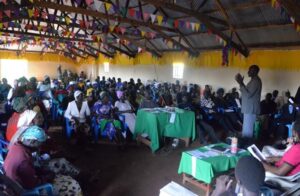
It could be overwhelming to confront such a human tragedy, but Cathy’s well-trained team faces it head-on in the hope and the power of the Gospel. Cathy draws on decades of experience treating trauma as a licensed social worker in the U.S. before the Lord called her to East Africa. In her current role as Counseling Coordinator for the Diocese of Masindi-Kitara, Cathy had been treating Ugandan teenagers at a local remand home for incarcerated young boys awaiting court dates. Cathy still carries out that important work, while ministering to the burgeoning refugee population and their dilemma that God had placed in front of her in late 2023.
With the scale of suffering that exists at the Kiryandongo Camp, one question arises: How can this many people possibly be treated who have experienced such terrible things? Much of the answer lies in the power of the Gospel, not only to open up people to understand their own response to trauma and begin to heal, but then to also trust that those same people will take what they’ve learned to others. It’s a replicative model of treatment that by God’s grace makes use of Scripture, small groups and guided teaching.
 Cathy and her team typically speak to an assembled group from churches within the camp about trauma and teach them what trauma looks like, what the responses to it typically are, and why people respond the way they do. They use the story of Elijah and the dramatic showdown on Mount Carmel where Elijah successfully demonstrates the power of God over Baal, which prompts Queen Jezebel to threaten to kill him, creating intense fear and a desperate flight for his life (one of the four main responses to trauma). God intervenes with the appearance of an angel who provides for him. Elijah reaches Horeb where he encounters the still small voice of God which reassures him of his purpose and gives him new instructions.
Cathy and her team typically speak to an assembled group from churches within the camp about trauma and teach them what trauma looks like, what the responses to it typically are, and why people respond the way they do. They use the story of Elijah and the dramatic showdown on Mount Carmel where Elijah successfully demonstrates the power of God over Baal, which prompts Queen Jezebel to threaten to kill him, creating intense fear and a desperate flight for his life (one of the four main responses to trauma). God intervenes with the appearance of an angel who provides for him. Elijah reaches Horeb where he encounters the still small voice of God which reassures him of his purpose and gives him new instructions.
Not only does the story reveal the vulnerability of God’s own prophet, but it shows the reality of living as a Christian; that strong belief can be severely tested by acute suffering, and that turning to God for renewal again and again is vital, especially in times of crisis. The teaching is designed to show camp participants how they can also use this teaching with others within the camp. This ‘teaching plus training’ approach is designed so that the refugees can use it within their own churches inside the camp as they recognize those who have symptoms of trauma. After the group teaching, small group work is done where one-on-one therapy is held.
Cathy says, “We offer hope and we see real deliverance from the loss of it. We don’t have food, or clothes, or other assistance to give them. We offer something far better. We offer them Jesus, his healing, and his transforming love. The Gospel promise of real and lasting restoration through healing is at work here among a people who have lost everything.”